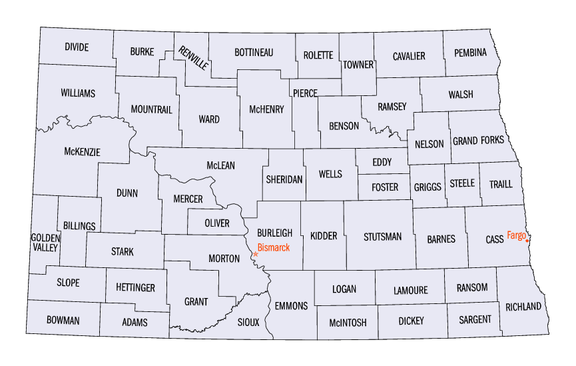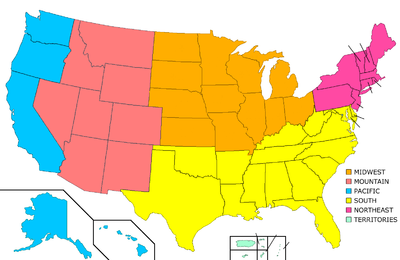- North Dakota census statistical areas
-
The United States Census Bureau has defined one Combined Statistical Area (CSA),[1] three Metropolitan Statistical Areas (MSAs),[2] and five Micropolitan Statistical Areas (μSAs)[3] in the State of North Dakota. The following table describes these areas with the following information:
- The name of the Combined Statistical Area (CSA), if any.[1][4]
- The population of the CSA as of 2006-07-01, as estimated by the United States Census Bureau.[5][6]
- The name of the Core Based Statistical Area (CBSA).[7][4]
- The population of the CBSA as of 2006-07-01, as estimated by the United States Census Bureau.[8][6]
- The name of the county.[4]
- The population of the county as of 2006-07-01, as estimated by the United States Census Bureau.[9][6]
See also
United States census statistical areas by state, district, or territoryNDASMPGUVI- State of North Dakota
- Demographics of North Dakota
- Geography of North Dakota
- United States
References
- ^ a b The United States Census Bureau defines a Combined Statistical Area (CSA) as an aggregate of adjacent Core Based Statistical Areas that are linked by commuting ties.
- ^ The United States Census Bureau defines a Metropolitan Statistical Area (MSA) as a Core Based Statistical Area having at least one urbanized area of 50,000 or more population, plus adjacent territory that has a high degree of social and economic integration with the core as measured by commuting ties.
- ^ The United States Census Bureau defines a Micropolitan Statistical Area (μSA) as a Core Based Statistical Area having at least one urban cluster of at least 10,000 but less than 50,000 population, plus adjacent territory that has a high degree of social and economic integration with the core as measured by commuting ties.
- ^ a b c An area that extends into more than one state is displayed in teal. An out-of-state area is displayed in green.
- ^ "Annual Estimates of the Population of Combined Statistical Areas: April 1, 2000 to July 1, 2006 (CBSA-EST2006-02)" (CSV). 2006 Population Estimates. United States Census Bureau, Population Division. 2007-04-05. http://www.census.gov/population/www/estimates/metro_general/2006/CBSA-EST2006-02.csv. Retrieved 2007-04-08.
- ^ a b c The total population of a multi-state area is displayed in teal, with the in-state population displayed below in black. The population of an out-of-state area is displayed in green.
- ^ The United States Census Bureau defines a Core Based Statistical Area (CBSA) as one or more adjacent counties or county equivalents that have at least one urban cluster of at least 10,000 population, plus adjacent territory that has a high degree of social and economic integration with the core as measured by commuting ties. The Census Bureau has defined two types of CBSAs: (1) a Metropolitan Statistical Area (MSA), which has an urban core population of 50,000 or more, or (2) a Micropolitan Statistical Area (μSA), which has an urban core population of 10,000 or more but less than 50,000.
- ^ "Annual Estimates of the Population of Metropolitan and Micropolitan Statistical Areas: April 1, 2000 to July 1, 2006 (CBSA-EST2006-01)" (CSV). 2006 Population Estimates. United States Census Bureau, Population Division. 2007-04-05. http://www.census.gov/population/www/estimates/metro_general/2006/CBSA-EST2006-01.csv. Retrieved 2007-04-08.
- ^ "Annual County Population Estimates and Estimated Components of Change: April 1, 2000 to July 1, 2006 (CO-EST2006-alldata)" (CSV). 2006 Population Estimates. United States Census Bureau, Population Division. 2007-03-22. http://www.census.gov/popest/counties/files/CO-EST2006-ALLDATA.csv. Retrieved 2007-04-08.
External links
Categories:- Metropolitan areas of North Dakota
- Micropolitan areas of North Dakota
- Census statistical areas
- North Dakota-related lists
Wikimedia Foundation. 2010.


